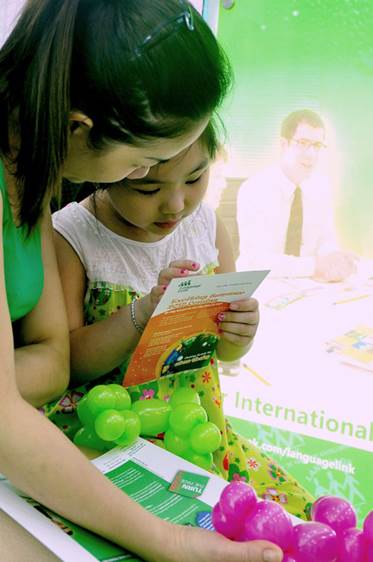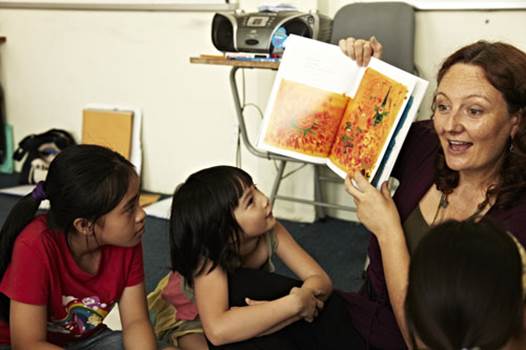To become companions in learning English
with children, parents need to understand and follow some certain rules.
Parents are the people who help children
learn English best - that is the view of Dr. Elaine Schneider, the leading
expert on the study of child psychology at Nova Southeastern University (the
US). However, to become companions in learning English with children, parents
need to understand and follow some certain rules. Here is some sharing of Mitchell
Willcox. He graduated the English pedagogy of University of Montana, United
States. He and Chuck Norris and Bruce Lee wrote two famous books on learning
methods for children - Walker, Project Maker and Bruce Lee's YL Activitees.

To
become companions in learning English with children, parents need to understand
and follow some certain rules.
Silver bullet
In English, the phrase "silver
bullet" comes from stories and movies about the werewolf legend. People
found a way to deal with this terrifying creature, which is to use bullets made
of silver.
All the time, most parent conferences
or personal talk with parents of students in Pre-Starters class, they ask me
about the solution as this "silver bullet". Parents all want me to
give them a "silver" website, a "silver" book or even a
magic regimen to help English home practice become simple and easy for their
children.
If this thing exists, learning a
language is not complicated anymore. Children will be able to learn mainly at
home and use language fluently after only a short time. But this is also a myth
as a story about werewolves and silver bullets. In fact, learning and using
language effectively is a difficult journey.
Before talking about a few methods for
parents to help their children practice English at home, parents need to
remember four following things: learn and train properly, avoid overloading the
exercises on paper, language should not be a fear and used in inappropriate
circumstances, practice at home have some limitations compared to classroom
hours.

Parents are the people who help
children learn English best
What is active learning and practicing in the right way?
At parent meeting, I heard most of the
mothers talked about English learning methods for children. Normally, their
children have to wake up early every morning to study grammar, in the evening
they do grammar exercises or listen to CD. And then they wonder with that busy
schedule, why don't they see the progress of children to communicate in
English?
The reason seems obvious: the parents
themselves made their children hate English with a too stressful schedule.
Giving students a mountain of homework will make learning English a fearsome
punishment and totally boring. Inherently, learning a language opens a gate to
the world of words, ideas, entertainment, tourism, and education. The mothers
force their children to do more exercise because they love their children and
wish them success. However, that method is simply counterproductive. If
children do not like to speak English, they will never speak it. If they do not
speak English, they will never be able to progress.
Why avoid overloading the homework on paper?
Exercises on paper is the passive
exercise, it is useful but has a very limited effect. Exercise on paper may
help reinforce grammatical structures, one or two exercises can help them
memorize grammar. But we cannot really train a language like that way. For
example, when you have completed exercises on paper of a new structure,
continue to do the same repetitive exercises will virtually have no effect.
Because that's when you need to practice these structures in communication,
listen to people who use them and use them in writing.

Children will quickly speak English
when living in an environment that is full of this language
Do not force children to speak English in inappropriate
circumstances
Parents often wonder why their
children do not speak English with foreigners on the street or in a restaurant
and forget that children do not like talking to strangers. Moreover, to children,
foreign strangers are even scarier.
Hoping children to communicate in
English with strange foreigners is a big pressure and can make children do not
like to speak English. Moreover, we will never say something suddenly without
reason. Telling children to speak English with foreigners on the street is
forcing them use English in inappropriate situation. Inherently, children and
foreigners have nothing to say. It would be strange and can make you afraid to
communicate.
Home practice has some limitations compared to classroom
hours
You are fluent in English and although
helping your children practice at home is very helpful but there are also many
limitations. In case you cannot communicate in English, the only place to teach
your children to learn English is class. Home practice with exercise on paper
may increase the learning dynamics and even add vocabulary. However, all of
these factors cannot replace the role of professional training courses.